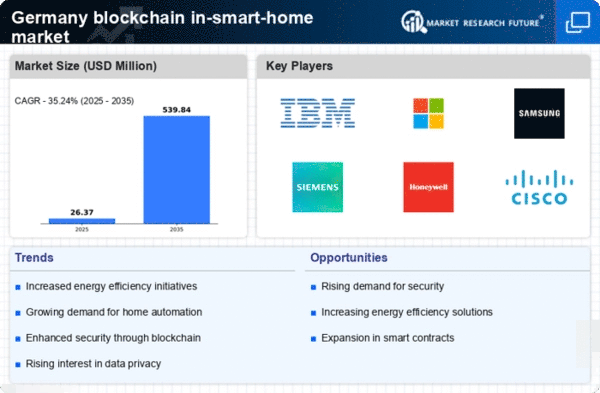Advancements in IoT Technology
The rapid advancements in Internet of Things (IoT) technology are significantly influencing the blockchain in-smart-home market. In Germany, the number of connected devices is expected to surpass 50 million by 2025, creating a complex ecosystem that requires efficient management. Blockchain technology can enhance the interoperability of these devices, ensuring secure communication and data exchange. By providing a decentralized ledger, blockchain can facilitate real-time updates and transactions among devices, reducing latency and improving overall system performance. This synergy between IoT and blockchain is likely to drive innovation in smart home applications, making them more efficient and user-friendly.
Increased Focus on Data Privacy
Data privacy concerns are becoming increasingly prominent among consumers, driving the blockchain in-smart-home market. In Germany, stringent data protection regulations, such as the General Data Protection Regulation (GDPR), have heightened awareness regarding personal data security. Consumers are more cautious about how their data is collected, stored, and utilized. Blockchain technology offers a decentralized approach to data management, allowing users to maintain control over their personal information. This capability is particularly appealing in the context of smart homes, where numerous devices collect sensitive data. As privacy concerns continue to rise, the integration of blockchain solutions in smart home systems may become essential for ensuring compliance with regulations and fostering consumer trust.
Support from Industry Stakeholders
The blockchain in-smart-home market is experiencing a surge in support from various industry stakeholders, including technology providers, energy companies, and government entities. In Germany, initiatives aimed at fostering digital innovation are gaining momentum, with investments in smart technologies expected to exceed €1 billion by 2025. This collaborative environment encourages the development of blockchain solutions tailored for smart homes. Industry stakeholders recognize the potential of blockchain to enhance security, efficiency, and transparency in smart home applications. As partnerships and collaborations increase, the blockchain in-smart-home market is likely to benefit from shared resources and expertise, accelerating the pace of innovation and adoption.
Growing Demand for Smart Home Solutions
The increasing consumer interest in smart home technologies is a primary driver for the blockchain in-smart-home market. In Germany, the smart home market is projected to reach approximately €4 billion by 2025, indicating a robust growth trajectory. This demand is fueled by the desire for enhanced convenience, security, and energy management. As consumers seek integrated solutions that offer seamless connectivity and control, the blockchain in-smart-home market stands to benefit significantly. Blockchain technology can provide secure and transparent transactions, ensuring that devices communicate effectively and securely. This growing demand for smart home solutions is likely to propel the adoption of blockchain technology, as it offers a reliable framework for managing the complexities of interconnected devices.
Rising Energy Costs and Sustainability Initiatives
The increasing energy costs in Germany are prompting consumers to seek more efficient energy management solutions, thereby driving the blockchain in-smart-home market. With energy prices projected to rise by approximately 15% over the next five years, homeowners are looking for ways to optimize their energy consumption. Blockchain technology can play a crucial role in this context by enabling peer-to-peer energy trading and facilitating the integration of renewable energy sources. This not only promotes sustainability but also empowers consumers to take control of their energy usage. As sustainability initiatives gain traction, the blockchain in-smart-home market is likely to see increased adoption as a means to achieve energy efficiency.
















